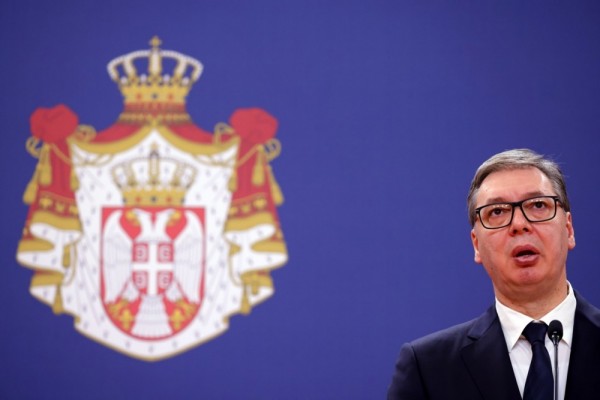The publication of the European Commission’s annual rule of law report serves as a crucial mechanism for assessing the state of press freedom, democracy, and human rights within EU Member States.
In an era marked by escalating challenges to press freedom across Europe, our coalition stresses the need for concrete dialogue and robust measures for the enforcement of democratic standards and fundamental rights. Join us in championing the cause of democracy, equality, and freedom of expression.
The undersigned 38 civil society, human rights, journalist and media support organisations call on the European Commission to strengthen the effectiveness of the rule of law dialogue, improve the impact of reporting and take decisive action against systematic human rights violations in the EU Member States.
In July 2024, the European Commission will publish its fifth annual rule of law report, the last one during its current term of office. While there have been some improvements in the reporting process, such as the publication of the calendar of country visits, many horizontal issues on both process and content that were highlighted in previous joint civil society statements remain unaddressed. These include the persistent problems in the Commission’s systematic and transparent cooperation with civil society organisations throughout the reporting cycle, the lack of specificity of recommendations, the failure of Member States to implement court decisions and the restrictions on media freedom and freedom of expression, association and assembly. At a time when the rule of law is increasingly being called into question across Europe, it is more necessary than ever for the rule of law report to be critical, specific and linked to enforcement tools.
Following the European elections from 6 to 9 June 2024, the new President of the European Commission should demonstrate their commitment to and vision for the rule of law by giving the new Commissioner an ambitious mandate to further develop and strengthen the rule of law report and mechanism to become more transparent, participatory and effective.
The following recommendations are divided into recommendations for the next European Commission (1-3), and recommendations to increase the effectiveness of rule of law reporting (4-8).
Our main recommendations to the Commission are:
- Strengthen the rule of law as a key priority in the next Commission programme
- A strong mandate for the new Commissioner for Justice
- Better self-assessment of the rule of law effectiveness
- Continue the annual rule of law reports and make them more contextual and detailed
- Address continuing concerns about civic space
- Take firm and systematic action against the non-implementation of court decisions
- Protect freedom of expression and information and media freedom
- Improve the visibility and awareness of the rule of law report
1. Strengthen the rule of law as a key priority in the next Commission programme
We believe that the rule of law must remain a top priority in the next Commission’s work programme and must be further strengthened. The rule of law is crucial for the protection of democratic processes and the defence of EU Treaty values, including human rights. Therefore, the scope of the rule of law toolbox should be flexible enough to assess the impact of rule of law deficits in Member States on human rights, equality and democracy. Improving the rule of law in EU Member States also increases the functionality of EU institutions.
The EU’s commitment to the rule of law also strengthens the Union’s reputation in its external action by demonstrating its unwavering commitment to upholding democratic values. Emphasising the importance of rights and values in the EU’s internal and external action is crucial in these times of major global challenges, when violations of the rule of law are on the rise.
2. A strong mandate for a new Commissioner for Justice
It is important that the new Commission President’s letter to the appointed Justice Commissioner contains a clear mandate setting out the Commissioner’s responsibility for ensuring the implementation of rule of law standards across the EU and for adopting specific measures to protect them. In line with Article 2 TEU, the Commissioner’s mandate should include strong safeguards for the protection and promotion of the rule of law, democracy, equality and fundamental rights.
The Commissioner’s monitoring role should be strengthened so that violations in the Member States can be quickly detected and reported, and preventive measures can be discussed with the respective governments. The mandate should also place a strong emphasis on the relevant judgments of the Court of Justice of the EU (CJEU) and their consistent enforcement. In addition, it will be important that the President mandates the Commissioner for Justice to work more closely and more intensively with civil society organisations in upholding the rule of law.
It would also be appropriate to increase the number of staff with expertise in this area within DG JUST. Under the leadership of the Commissioner, the DG should establish a unit dedicated to the monitoring and implementation of CJEU judgments and provide a training programme for national authorities on rule of law issues and the EU framework in this area.
Prioritising the rule of law with specific powers in the Commissioner’s terms of reference underlines the commitment of the EU and its institutions to uphold the fundamental values enshrined in the Treaties.
3. Better self-assessment of the rule of law effectiveness
The Commission should prioritise guiding Member States in the application of rule of law instruments and compliance with rule of law principles, including throughout the reporting cycle. For the EU’s rule of law toolbox to prove effective, it is crucial that the EU itself takes a transparent approach to the use of its rule of law instruments in the Member States. There is currently a risk that political considerations related to the freezing and unfreezing of EU funds under the conditionality mechanisms, rather than compliance with benchmarks set by the Commission, undermine the effectiveness and credibility of the EU rule of law framework.
The Commission should ensure the proactive and consistent application of the rule of law framework against any Member State that violates democratic values and the full protection of the EU’s financial interests. The system for assessing the performance of Member States should be improved through clearer performance assessments and analyses in the reports. The Commission must monitor the impact of the recommendations contained in the report more frequently and in more detail. This includes an assessment of whether the recommendations are being implemented or whether a Member State is trying to address shortcomings through genuine reform efforts. The Commission should clarify what additional measures are required if the state does not fully implement the recommendation.
The Commission should involve independent experts and civil society in the elaboration of the recommendations and the assessment of Member State’s progress, the centrepiece of which should be the remedying of abuses by the respective governments at a national level.
In addition, there should be a sufficient link between reporting and action, as the conclusions and recommendations so far lack a concrete link to the EU’s other rule of law instruments.
4. Continue the annual rule of law reports and make them more contextual and detailed
The application of the rule of law and the protection of human rights are interdependent and overlapping objectives. The annual rule of law reports would benefit from the introduction of intersectional analyses that address specific marginalised groups at the intersections of discrimination and a more in-depth review of human rights issues and violations in the Member States.
The Commission should also better communicate the rule of law reports. Recommendations should be more specific and measurable and serve as clear benchmarks for legislative, policy and institutional reform for Member States. This also applies to the way in which the specific recommendations in the country chapters are selected, assessed and implemented, as well as to the benchmarks used to assess the situation in a Member State.
The country chapters of the 2023 report emphasised the positive aspects of Member States’ reform progress, while downplaying or glossing over the remaining challenges and evidence-based shortcomings. Future reports must clearly show both the progress made by Member States and the lack of progress, backed up with evidence-based information and include specific and time-bound recommendations and benchmarks.
5. Address continuing concerns about civic space
Unlawful restrictions were reported in several Member States, including the right to protest and an increasingly hostile environment for civil society organisations. Issues such as defamation and smear campaigns, criminalisation of non-governmental organisations (NGOs) that, for example, support migrants, receive foreign funding or work against institutional racism in society. All of this is a major obstacle to the rule of law.
The EU should establish a mechanism that enables civil society and human rights defenders to report unlawful restrictions and attacks against them. Such a mechanism will also prioritise prevention by ensuring direct support to these actors and accountability of national authorities and the government for such negative developments, rather than just a reactive response from the EU.
It is crucial that the EU involves civil society organisations in all aspects of the rule of law toolkit, including throughout the reporting cycle. Furthermore, the rule of law report should more consistently address violations of civic space in the country chapters and provide strong and clear recommendations against such violations.
6. Take firm and systematic action against the non-implementation of court decisions
The Commission should develop a systematic approach to respond effectively to cases where Member States do not implement the decisions of the European courts. National and local civil society organisations and NHRIs should be seen as partners in achieving this goal by assisting in the implementation of court decisions at a national level and reporting cases of non-implementation to the Commission. DG JUST should establish a dedicated unit for the monitoring and implementation of CJEU judgments, including infringements at national level. The Commission should propose that the court impose financial penalties in cases of non-compliance.
In view of the resumption of negotiations on the EU’s accession to the ECHR under Article 6(2) TEU, it is important to better address the non-implementation of ECtHR judgments in the Member States in the rule of law report.
In parallel, the Commission should use other available instruments, including financial measures and infringement procedures, to put pressure on Member States that fail to implement reforms in line with the Court’s judgements.
7. Protect freedom of expression and information and media freedom
In future rule of law reports, the Commission should fully assess how each Member State ensures the implementation of key legal instruments in the area of media freedom, such as the European Media Freedom Act (EMFA), the Recommendation on the protection, safety and empowerment of journalists, the Directive on the protection of persons participating in public life from manifestly unfounded or abusive legal proceedings (Anti-SLAPP Directive) and the Recommendation on strategic lawsuits against public participation (anti-SLAPP Recommendation).
We believe this is important due to the decline of media freedom and protection of journalists in many EU Member States. As documented in a number of reports (e.g. Media Pluralism Monitor 2023, Mapping Media Freedom), there have been numerous attacks on journalists and efforts to limit media freedom. Although two important dossiers – the EMFA and the Anti-SLAPP Directive – were approved at the end of 2023, concerns remain as to whether these laws can improve the situation of journalists and media in the EU. The political will of the EU Member States is needed for an ambitious implementation.
The next Commissioner should be equipped with strong legitimacy in this area in order to make press freedom and the right to information a priority for the next term of office.
8. Improve the visibility and awareness of the rule of law report
Under the Commission’s current mandate, the rule of law reports have been published just before the summer break, which has effectively reduced the visibility of the report. Although the 2024 Rule of Law Report will again be published in July, the Commission’s new work programme provides an optimal opportunity to review the annual cycle and shift the publication date to increase the visibility of the report and attract more attention. The report should also be accompanied by user-friendly factsheets and other media contributions in all EU languages. The Commission should set up online country pages with all necessary information on reports, consultations, country missions and the implementation of recommendations by Member States to facilitate access to the process and understanding of rule of law issues for EU citizens and civil society alike.
We welcome the fact that the Commission has taken up our earlier recommendation to better communicate the timetables for its country visits. However, the transparency of the consultation partners in the different Member States still needs to be improved. Individuals and civil society organisations need to be informed about how they can participate in all stages of the reporting process. The reporting process can only be open, transparent and participatory if citizens are informed about the process and civil society is given sufficient time and resources to contribute.
Signatories:
- ACAT Belgium
- ACAT France
- ALDA – European Association for Local Democracy
- ARTICLE 19
- Association of European Journalists (AEJ)
- Citizens Network Watchdog Poland
- Civil Liberties Union for Europe
- Committee to Protect Journalists
- Community Media Forum Europe
- Democracy Reporting International (DRI)
- DEMAS – Association for Democracy Assistance and Human Rights
- Demo Finland
- Europäischer Austausch / European Exchange
- European Centre for Press and Media Freedom (ECPMF)
- European Federation of Journalists (EFJ)
- European Partnership for Democracy (EPD)
- Fédération internationale des ACAT / International Federation of ACAT
- Fédération internationale pour les droits humains (FIDH)
- Free Press Unlimited
- Human Rights and Democracy Network Internal Working Group
- Human Rights House Foundation
- Human Rights House Zagreb
- Human Rights Watch
- Hungarian Helsinki Committee
- IFEX
- ILGA Europe – European region of the International Lesbian, Gay, Bisexual, Trans and Intersex Association
- Initiative for Freedom of Expression – Turkey (IFOX)
- International Commission of Jurists (ICJ)
- International Planned Parenthood Federation European Network (IPPF EN)
- International Press Institute (IPI)
- International Rehabilitation Council for Torture Victims (IRCT)
- Netherlands Helsinki Committee
- Osservatorio Balcani Caucaso Transeuropa
- Protection International
- Reporters Without Borders (RSF)
- Society of Journalists
- South East Europe Media Organisation (SEEMO)
- WACC Europe



